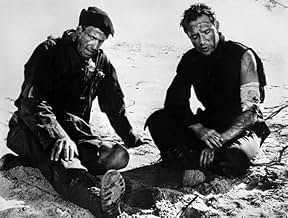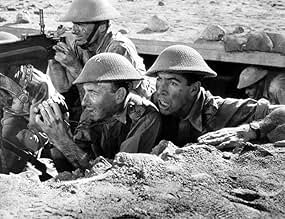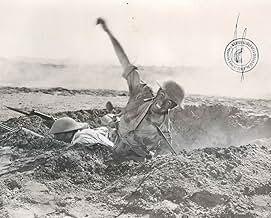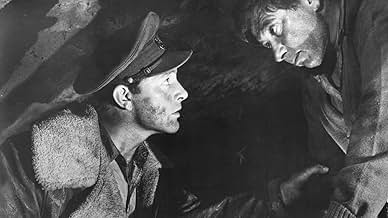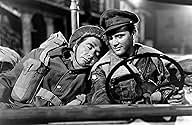Ajouter une intrigue dans votre langueRichard Burton plays a Scottish Army officer put in charge of a disparate band of ANZAC troops on the perimeter of Tobruk with the German Army doing their best to dislodge them.Richard Burton plays a Scottish Army officer put in charge of a disparate band of ANZAC troops on the perimeter of Tobruk with the German Army doing their best to dislodge them.Richard Burton plays a Scottish Army officer put in charge of a disparate band of ANZAC troops on the perimeter of Tobruk with the German Army doing their best to dislodge them.
- Nommé pour 1 Oscar
- 1 victoire et 1 nomination au total
- Lt. Harry Carstairs
- (as Charles Tingwell)
- English Officer
- (non crédité)
- Corporal
- (non crédité)
- British Officer
- (non crédité)
- Sergeant
- (non crédité)
- German Lieutenant
- (non crédité)
- German Gunner
- (non crédité)
- German Radio Man
- (non crédité)
- German Orderly
- (non crédité)
- Colonel
- (non crédité)
Avis à la une
In 1941 British and Australian troops had control of the fortress town of Tobruk in Libya. Tobruk gets surrounded by German and Italian troops as the Axis tries to take Egypt and the Suez Canal. The British high command order the Australian General Leslie Morshead to hold Tobruk for 2 months to disrupt the German supply lines. Morshead was a clever commander, trapping German tanks to make them useless and made his troops fight a tough guerrilla campaign. The main focus of the film is on a British officer, 'Tammy' MacRoberts who is given command of a fresh batch of Australian troops, including his former school master. He has to train his troops to get them ready for the battle and first the bitter war.
The acting isn't that good, the Australian accents were awful and it would have been easier if their casted Australian actors. As well their seem to be an American officer with the British and Australians ones, I don't know why? What makes the film work is the war scenes. They are well done and you get to feel the action and sweat of battle. The film is also a short, tort experience. Also there is an historical inaccuracy; the Desert Rats was the name for the 9th Armoured Division of the British Army, not the 7th Australian Army. However Rommel did call the army the rats of Tobruk.
Personally I would like to see a new film about the war in North Africa because their are many interesting stories and battles, from the Battle of El-Alamein, the story of Rommel and Montgomery, Operation Touch, the Birth of the SAS, etc... The Siege of Tobruk would also make an interesting story for a modern film.
Although the story has neither the forced authenticity of 'The Longest Day' or the Hollywood panache of 'Where Eagles Dare' I believe it still manages to stand out in a special place on its own. Prior to a host of many other war movies it was the first to concentrate exclusively on the common soldier in the trenches, his anxieties for the present and hopes for the future. I also liked the side story of the young captain who is surprised to have under his command a favourite old school master, Bartlett played by Robert Newton. It causes some quizzical looks amongst the men, especially when he insists on continuing to address the old private as sir. Here the Desert Fox is played with dignity and respect by James Mason. The other german characters are also portrayed benignly, perhaps in view of the fact that very few atrocities were committed by Rommel's troops unlike their counterparts in Eastern Europe. History records accurately what eventually happened to Rommel in the aftermath of the plot to assassinate Hitler but here that is all in the near future. I recommend this b & w film to all war movie buffs of this English made genre but if you're looking for 'Saving Private Ryan' perhaps you should give it a miss.
One of the most realistic and best of the fifties war movies with excellent direction by Robert Wise
This reconstruction of a phase in the battle of Tobruk(deeds also filmed by Arthur Hiller in ¨Tobruk¨ with Rock Hudson) is correctly based on true events, though excessive importance for the Aussies. The actual deeds are based on series of engagements between British and Axis forces over Libyan port. Occupied by Italy 1911, Tobruk was taken by Britain in Operation Battleaxe 1941.It was captured by Field Marshal Erwin Rommel June 1942 after the retreat of the main British force to Egypt, and this precipitated General Sir Claude Auchinleck's replacement by General Bernard Montgomery as British commander. Montgomery recovered it after the second of Battle of El Alamein and it remained in British hands for the rest of the war.
Le saviez-vous
- AnecdotesThe film was banned in Egypt, as the British were still occupying the Suez Canal and the Sudan.
- GaffesDuring the raid on the German camp there is a sign on a building reading "Hauptquartiers". Although the English word "Headquarters" might suggest a plural s, in German there doesn't exist such a form. The correct word would be "Hauptquartier" and the plural "Hauptquartiere"
- Citations
Tom Bartlett: You don't know much about real fear, Tammy. Maybe it comes with age or the bottle. You don't know what it is to be a coward... really a coward. To know it, yet to hope one day something will happen to prove that you're not, yet half the time not really believing that either.
- Crédits fousOpening credits prologue: 1941 LIBYAN DESERT NORTH AFRICA
- ConnexionsEdited into La guerre, la musique, Hollywood et nous... (1976)
- Bandes originalesWaltzing Matilda
(1895) (uncredited)
Original music by Christina Macpherson (1895)
(Based on the Scottish tune "Craigielee", music by James Barr, with words by Robert Tannahill)
Revised music by Marie Cowan (1903)
Lyrics by A.B. 'Banjo' Paterson (1895)
Played during the opening credits and often in the score
Meilleurs choix
- How long is The Desert Rats?Alimenté par Alexa
Détails
Box-office
- Budget
- 1 320 000 $US (estimé)
- Durée
- 1h 28min(88 min)
- Couleur
- Rapport de forme
- 1.37 : 1


